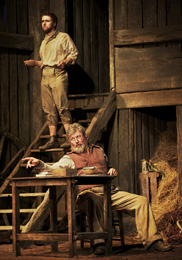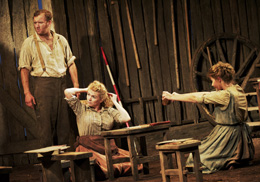In a time of austerity and inexorable pressure to conform to a nominally benign but fundamentally aggressive centrism that is threatening the erasure of sovereignty, the native Irish face the challenge of holding onto their uniqueness. Education may be the key to preserving the sense of the ‘why’ that comes with the ‘how’ of learning language and history: the meaning of how things come to be seen or to be named, the process by which they are understood, and the consequences of the differences that arise when uses and interpretations of those meanings differ are ever more vital.
The setting is Donegal in 1833 in the Hedge School of Master Hugh O’Donnell, teacher of Greek, Latin, Mathematics, and erudition, while English mapmakers reshape the landscape by measuring and renaming it. The play comes from Derry in 1980, a time and place still steeped in the postcolonial struggles of language and politics that defined the era. The production is on the National Theatre stage in 2011 as Europe stands at a crossroads, or maybe a precipice.
Why do we return to Brian Friel’s Translations? What is it we expect to experience when we encounter it? At this point there is no question but that it has entered the canon, and that its contextual reading in terms of twentieth-century Irish politics and culture is inherent in its history since 1980. This is one of the most significant pieces of Irish theatre of the past half century, and its reputation remains undiminished even as the cultural turn has shifted from its immediate concerns. Like Chekhov, with whom he shares so many obsessions, Friel’s work has passed out of time and into repertoire.
 Translations is in itself and remains a brilliant and powerful work of theatre. It is a precisely written, intellectually engaging study of the liminal and contested spaces between description and denomination, in which the personal and the political conflate beautifully because the characters are at once so articulate and so self-aware. Early on, Manus (Aaron Monaghan) encourages Sarah (Janice Byrne) as she overcomes her speech impediment with the sentiment that nothing can stop her once she has spoken the line “My name is Sarah.” The act of articulation is an act of will, a shaping of self and an enabling of selfhood, as encouraged by Hugh (Denis Conway). Hugh teaches Greek and Latin to Irish speakers, lauding the pleasures of lost civilizations in the language of a culture fading by degrees. Yet we are warned of overly enshrining the image of the past in ways that “no longer match the landscape of fact”, and advised that renewal is to be welcomed. The tragedy and irony of the frequent and consistent disconnections that define the ways in which the characters engage with each other (failed romances, failed understanding, failed diplomacy, failed translations) is never unclear or inarticulate, and the articulation is always enthralling.
Translations is in itself and remains a brilliant and powerful work of theatre. It is a precisely written, intellectually engaging study of the liminal and contested spaces between description and denomination, in which the personal and the political conflate beautifully because the characters are at once so articulate and so self-aware. Early on, Manus (Aaron Monaghan) encourages Sarah (Janice Byrne) as she overcomes her speech impediment with the sentiment that nothing can stop her once she has spoken the line “My name is Sarah.” The act of articulation is an act of will, a shaping of self and an enabling of selfhood, as encouraged by Hugh (Denis Conway). Hugh teaches Greek and Latin to Irish speakers, lauding the pleasures of lost civilizations in the language of a culture fading by degrees. Yet we are warned of overly enshrining the image of the past in ways that “no longer match the landscape of fact”, and advised that renewal is to be welcomed. The tragedy and irony of the frequent and consistent disconnections that define the ways in which the characters engage with each other (failed romances, failed understanding, failed diplomacy, failed translations) is never unclear or inarticulate, and the articulation is always enthralling.
So, when we encounter this play in 2011, who are the Irish as a people that should respond to this unsubtle challenge to look to both the inside and the outside of the tribe to understand its past, present, and future? Is Translations a reflection of the past or a dire warning of the future? It is hard not to hear the glories of Greece and the dream of democracy spoken of with a longing for the loss of perfection as workers riot in the streets of Athens. Against what does contemporary Ireland measure itself, particularly now when language has again resurfaced as Barack Obama and Queen Elizabeth II have tried out the ‘cúpla focal’ to the delight of a public who allegedly no longer favour the compulsory teaching of Irish in schools? What has been lost, and what is in translation?
Unfortunately this production of Translations offers no new perspective. It is ably and professionally helmed by Conall Morrison to render the text without complication and is as clean and clear a presentation of Friel’s masterwork as any visitor to the National Theatre or to the country on the whole would care to encounter. But there is little in the way of interpretation here, beyond a faint echo of the Americas in the set design (which looks like a Frontier Fort) and costume (Donal O’Kelly as Jimmy Jack resembles nothing so much as a grizzled ‘old coot’ from a Western). Morrison keeps the pace steady and keeps faith with the script, directing his actors to clean, crisp characterisations that function as they should to move the plot forward and to deliver the dialogue with clarity in diction and meaning. Everything the play contains is legible and available, and it is well acted and respectable on every technical level.
 Denis Conway is a sympathetic and commanding Hugh, Aaron Monaghan renders Manus with tremendous tenderness, Donal O’Kelly entertainingly delivers Jimmy Jack as comic relief, Barry Ward is an understandable Owen, Tim Delap isn’t altogether offputting as the tricky character of Hibernophile Lieutenant Yolland (whose earnestness can wrankle) and Aoife McMahon makes a fair stab at the Ophelia-like collapse of her lovestruck Maire, though the character’s rapid transition from frustration with Manus to love for Yolland makes grounding her a little difficult. There is skill and commitment on stage and the story is told with due reverence.
Denis Conway is a sympathetic and commanding Hugh, Aaron Monaghan renders Manus with tremendous tenderness, Donal O’Kelly entertainingly delivers Jimmy Jack as comic relief, Barry Ward is an understandable Owen, Tim Delap isn’t altogether offputting as the tricky character of Hibernophile Lieutenant Yolland (whose earnestness can wrankle) and Aoife McMahon makes a fair stab at the Ophelia-like collapse of her lovestruck Maire, though the character’s rapid transition from frustration with Manus to love for Yolland makes grounding her a little difficult. There is skill and commitment on stage and the story is told with due reverence.
But for all that, it seems inert as a theatrical experience. Though thoughts come unbidden about what Ireland is now and what Europe has to teach us, there is nothing coming from the stage to shift the paradigm within which we are enabled to receive the play armed with its history. This is somehow faintly disappointing, but also not entirely unexpected. Perhaps Translations will always resist interpretation, because it is dense and beautiful enough as it is to demand our applause even if we don’t quite feel its energy anymore.
Harvey O'Brien